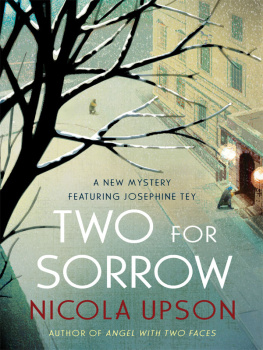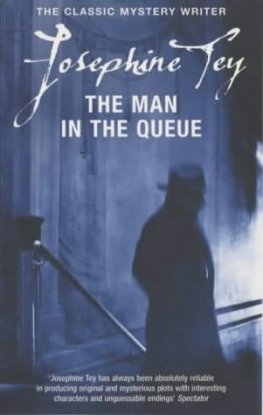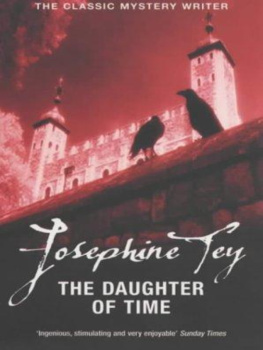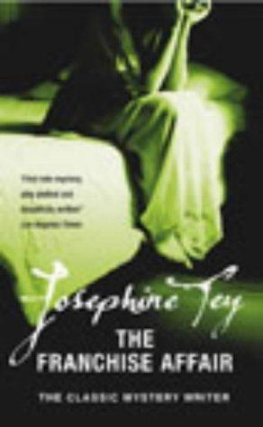NICOLA UPSON is the author of An Expert in Murder, her first mystery featuring Josephine Tey, and two works of nonfiction. She has worked in theater and as a freelance journalist. She is the recipient of an Escalator Award from Arts Council England, and she splits her time between Cambridge and Cornwall.
www.nicolaupson.com
Visit www.AuthorTracker.com for exclusive information on your favorite HarperCollins authors.

AN EXPERT IN MURDER
A Josephine Tey Mystery
ISBN 978-0-06-145155-3 (paperback)
Upson clearly knows her way around pre-World War II London and the grimy backstages of Covent Garden, and delivers an ending shot through with palpable surprise and emotion.
Los Angeles Times

ANGEL WITH TWO FACES
A New Mystery Featuring Josephine Tey
ISBN 978-0-06-145157-7 (paperback)
No classic detective fiction aficionado will want to miss Upsons compelling sequel. The subtle prose succeeds both at evoking the quiet splendor of the Cornish landscape and in capturing the tragedy and torment that plague many of the characters.
Publishers Weekly
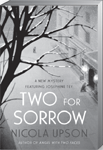
TWO FOR SORROW
A New Mystery Featuring Josephine Tey
ISBN 978-0-06-145158-4 (paperback)
When beloved mystery writer Josephine Tey sets out to write a novel about Amelia Sach and Annie Walters, the notorious Finchley baby farmers sentenced to death for a string of newborn murders, she has no idea that the research for her book will be used in the investigation of a modern-day killing.
Visit www.NicolaUpson.com and find Nicola on Facebook for the latest news and information on Nicolas books!
Available wherever books are sold, or call 1-800-331-3761 to order.
TWO FOR SORROW
A New Mystery Featuring Josephine Tey
Nicola Upson

First published in Great Britain in 2010 by Faber and Faber Ltd.
Quote from Nol Cowards Tonight at 8:30 by permission of Alan Brodie Representation Ltd, agent for NC Aventales AG, successor in title to the Estate of Nol Coward. Taken from Still Life (Tonight at 8:30), Collected Plays: Three, Methuen Drama, an imprint of A&C Black Publishers Ltd.
TWO FOR SORROW. Copyright 2010 by Nicola Upson.
All rights reserved under International and Pan-American Copyright Conventions. By payment of the required fees, you have been granted the non-exclusive, non-transferable right to access and read the text of this e-book on-screen. No part of this text may be reproduced, transmitted, down-loaded, decompiled, reverse engineered, or stored in or introduced into any information storage and retrieval system, in any form or by any means, whether electronic or mechanical, now known or hereinafter invented, without the express written permission of HarperCollins e-books.
FIRST U.S. EDITION
Library of Congress Cataloging-in-Publication Data is available upon request.
EPub Edition JULY 2011 ISBN: 9780062092540
11 12 13 14 15 ID/RRD 10 9 8 7 6 5 4 3 2 1
For Mandy. Two for joy.
Table of Contents
(untitled)
by Josephine Tey
First Draft
Holloway Gaol, Tuesday 3 February 1903
Morning arrived, cold and frosty and defiant, as unwanted as it was inevitable. Celia Bannerman looked up at two thin rows of glass, seven tiny panes in each, and wondered again why anyone had bothered to go through the motions of letting daylight into such a godforsaken place. Even if the dirt from the world outside had not made it all but impenetrable, the window would have been much too high to see from. Soot from the Camden Road was left to accumulate peacefully on the glass, shielding those inside from a life which continued without them. The cell was airless and oppressive. In the absence of adequate natural light, a lamp burned throughout the day and on into the night, denying the prisoner even the comforting anonymity of blackness. Like many other things about prison life, the brightness of the room was a compromisenever truly light and never truly dark, as if a denial of such extremes could somehow keep their equivalent emotions at bay.
From her chair in the corner, Celia watched the shadows dance over the cells familiar contents: a wooden wash-stand, with its pathetic ration of yellow soap, and a single filthy rag, meant to clean both mug and chamber pot but fit to touch neither; a corner shelf with a Bible for those still able to find comfort in its pages; and an enamel plate and knife, made from folded tin and sharp as a piece of cardboard. A low, black iron bedstead took up most of the rooms thirteen feet by seven. The woman in the bed had turned her face resolutely to the wall, but Celia knew she was not asleep. As she thought of what lay ahead, she felt the customary tightening in her stomach and, for a moment, she was a child again, remembering the mornings when she herself had pulled the blankets over her head and prayed for time to stand still so that she did not have to face what the day held. At the time, those young fears had seemed terrible enough, but surely nothing could compare with what was going through Amelia Sachs mind in the hours before her death.
Quietly, Celia stood up and walked over to the far side of the cell, where a dark-blue serge cloak hung on a hook, placed halfway down the wall to discourage those who might be tempted to take fate into their own hands. The bottom of the garment lay crumpled and dusty on the floor, and Celia rearranged the folds and smoothed the rough material as best she could, recognising the futility of the gesture but anxious not to let any opportunity of kindness go overlooked, no matter how small it seemed. In the three weeks between Sachs sentence and her execution, she was watched over constantly by two women at a timestrangers at first and then, as the days passed, allies, even friends. There was a peculiar intensity about the bond between wardress and prisoner: as she sat through her shifts, eight hours at a time, Celia shared every second of Sachs miserable existence, watching her as she washed and dressed, ate and cried, getting to know her habits and her preferences as she would have come to know a husbands in the early days of marriage. She had lived with Sach, and now she would see her to her death. Two warders had been brought in from another prison in case the distress of the execution proved too much for their female counterparts, but there was an unspoken determination amongst Celia and her colleagues to see this through to the bitter end: not because of suffrage or professional pride, not evenif she were honestbecause they wanted to comfort the prisoner in her final moments, but simply because it was too late. The emotional damage had already been done. By the time the final week came, all but the most hardened of hearts found themselves counting the days as desperately as the condemned woman herself.
Long periods of sitting had created a numbness in her legs and back which she would willingly have shared with her other senses. She stretched her cramped limbs and wriggled her foot to get rid of the pins and needles, and her colleagueasleep in the other chairsensed the movement and opened her eyes. The two women looked at each other, and Celia nodded. It was time. She walked over to the bed, holding her keys to stop them janglingridiculous, she thought, to suppose she could eliminate the reminders of incarceration, but it was another flicker of humanity to clutch atand noticed Sachs body stiffen in anticipation of the hand on her shoulder. As Celia drew back blankets which were far too thin for the time of year, the smell of stale linen, sweat and fear rose up to greet her. Sach moved closer to the wall and tried to pull the covers back over her, but the hand was firm and she eventually allowed herself to be cajoled to her feet. In vain, Celia tried to reconcile the tall, gaunt woman in front of her with the arrogant, unfeeling creature who had filled the pages of the press since her arrest back in November. Sach looked much older than her twenty-nine years. Her face was grey with exhaustion, and her body looked barely strong enough to get her to the scaffold. How different she was from the woman who had entered prison with an incredulity bordering on indignation, who had believed that this could never happen to her. Right now, crowds would be gathering outside the prison gates, waiting for the customary announcement, but had any of them come face to face with Amelia Sach, Celia doubted that they would recognise the monster who lived in their minds.

